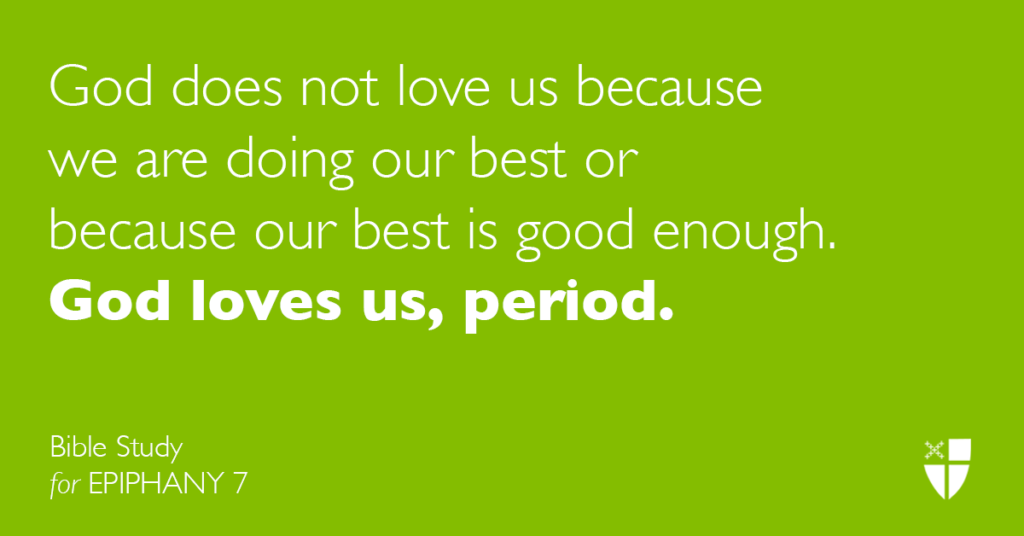Bible Study: Epiphany 7 (C) – 2019
February 24, 2019

Genesis 45:3-11, 15
This passage is the climax of Joseph’s story. It is the moment of reconciliation and forgiveness; it is the moment Joseph lays out how all the trials of his life have led to this scene. Crucially, it is Joseph who decides that the time of anger is passed, not his brothers or the imperial forces who abused him. Likewise, it is Joseph who chooses to interpret the pattern of his life and abuse he has endured as divinely guided. Joseph frees his brothers from the guilt of their wrongdoing, but he also does not give them the satisfaction of claiming credit for his success. Neither does he claim the credit himself. For Joseph, it is God who found a way to weave together the tragedies of slavery, sibling rivalry, famine, and economic oppression so that they revealed God’s forgiveness, grace, and faithfulness.
- What happens when we inappropriately declare that the time of anger is over for another person? What helps us discern when that time is right for ourselves?
- What does it look like to support a person who chooses to re-interpret the trials of their life as God’s will? How can we hold that truth for them while also not justifying wrongs and injustices?
Psalm 37:1-12, 41-42
“Wherever there is injustice, there is anger, and anger is like gasoline — if you spray it around and somebody lights a matchstick, you have an inferno. But anger inside an engine is powerful: it can drive us forward and can get us through dreadful moments and give us power.” – Scilla Elworthy
This psalm contains a strong, clear call to patience rather than anger or rage. Yet as Nobel Peace Prize nominee Scilla Elworthy points out, anger does not always lead to evil as the psalm suggests. Yet if we hope to use anger as gasoline to propel positive change, perhaps we should look to the patience this psalm recommends, after all. Anger gifts us with the urgency we need. With patience born of the trust in God, perhaps we can transform our anger at injustice into the energy we need to align ourselves with God’s saving grace in the world.
- How can our faith and our communities help us discern when we have too much anger? Too much patience?
- Anger is oftentimes a natural response to feeling out of control. Instead of regaining our own sense of control, this Psalm reminds us of God’s control over life and the world. Why might this be difficult for you to hear? Why might it be helpful?
1 Corinthians 15:35-38, 42-50
“Man is literally split in two: he has an awareness of his own splendid uniqueness in that he sticks out of nature with a towering majesty, and yet he goes back into the ground a few feet in order to blindly and dumbly rot and disappear forever.” – Ernest Becker
In this passage to the Corinthians, Paul reminds us that resurrection requires death. The reasons we have to fear death are overwhelming: uncertainty, separation, pain, and wasted potential. Certainly, Becker’s analysis that the denial of death lies at the root of all of humanity’s worst atrocities would speak to the terrible power of those fears. Paul instead hopes that these fears, and the doubts about the limits of the material and physical world expressed by his opponents, can be overcome by trust in God. Resurrection promises that all will be revealed, reunited, healed…and that nothing is wasted.
- What needs to be allowed to die in you, your life, or your community?
- Although the buried seed undergoes complete transformation, nothing from the original seed husk is wasted. How might we treat our physical bodies differently if we embraced their full incorporation into what comes next?
Luke 6:27-38
Allow yourself to be startled by how radical this familiar passage really is. Notice how much of our society would fall apart if every person followed these charges: lending without expecting anything in return, giving to anyone who begs from us. Reflect on how difficult it can sometimes be to love ourselves, let alone our enemies. It can be tempting to explain away such high expectations or commend ourselves for at least following them a bit better than our neighbors. Yet God does not love us because we are doing our best or because our best is good enough. God loves us, period. And part of reveling in that love is sitting in the discomfort of these deeply convicting words of Jesus.
- Jesus’ charges here are not just toward kindness and affection; they are economic in character. How does our faith stand in opposition to the economic expectations of the world around us? How do we hold our spiritual and economic well-being together?
- Part of our resistance to this passage may stem from our past experiences of others taking advantage of our kindness, generous, or willingness to endure difficult circumstances. How do your culture and society deal with the threat of being taken advantage of, physically, emotionally, or economically? How does God ask us to respond to that danger?
¡No olvide suscribirse al podcast Sermons That Work para escuchar este sermón y más en su aplicación de podcasting favorita! Las grabaciones se publican el jueves antes de cada fecha litúrgica.


